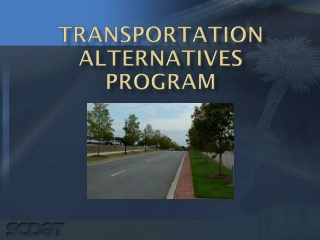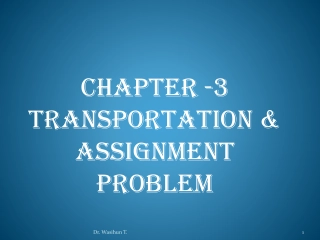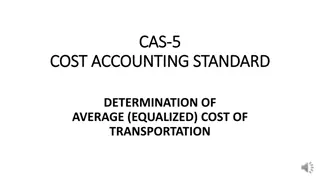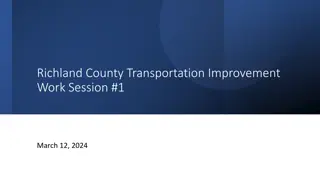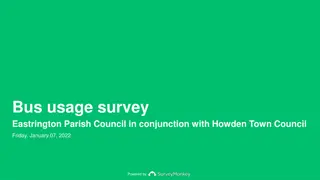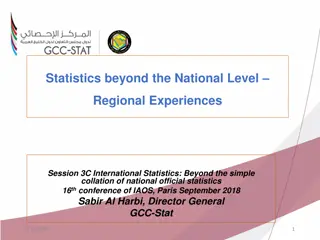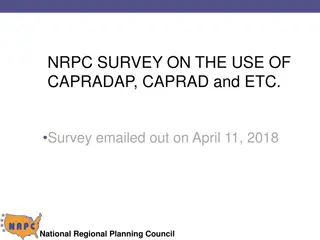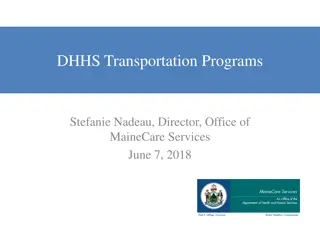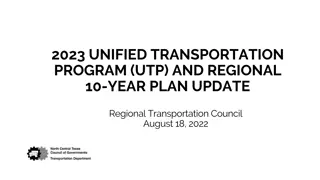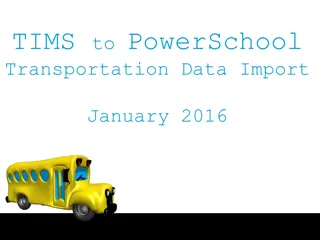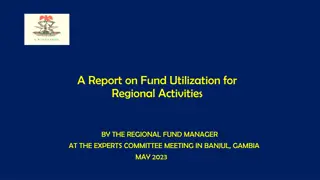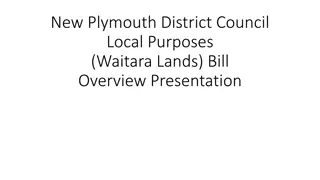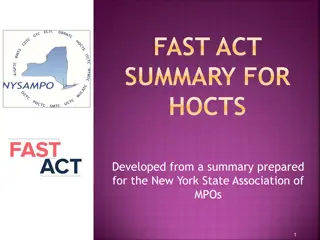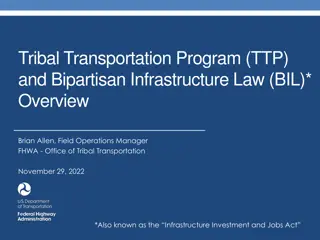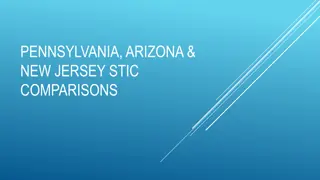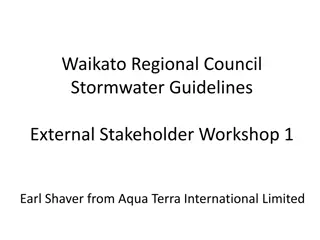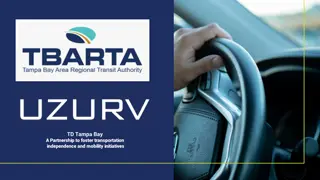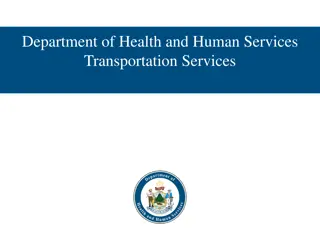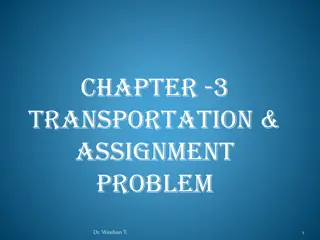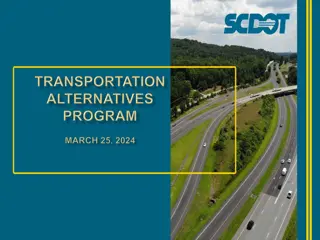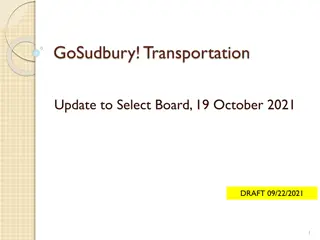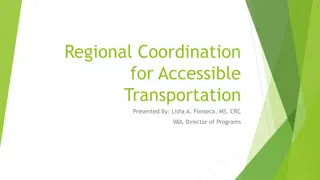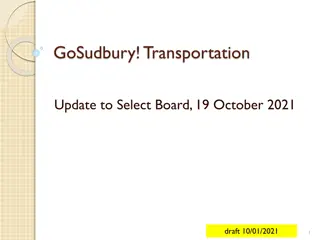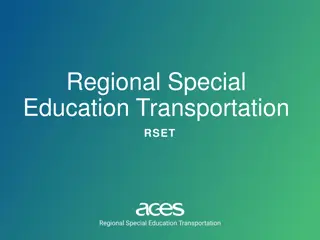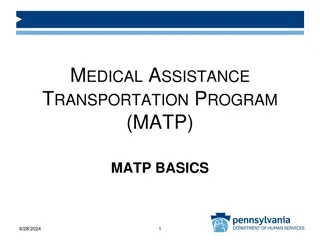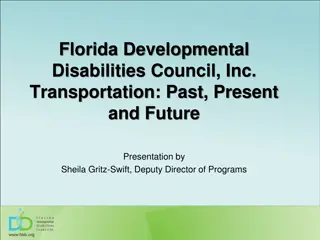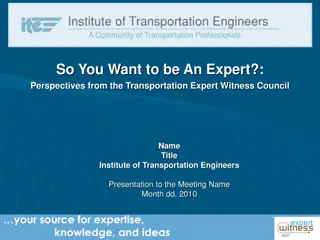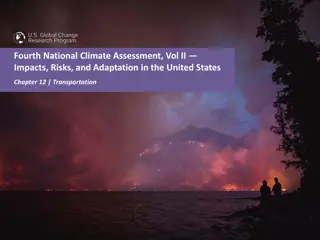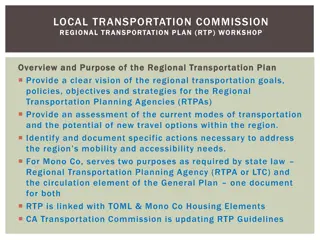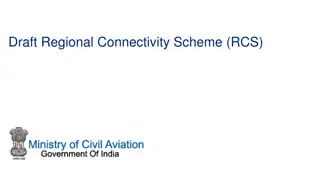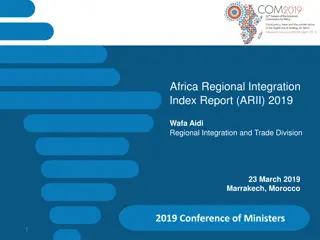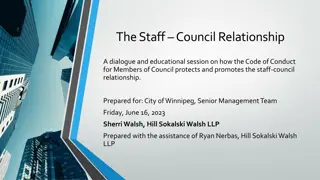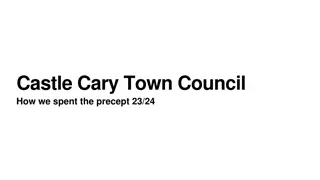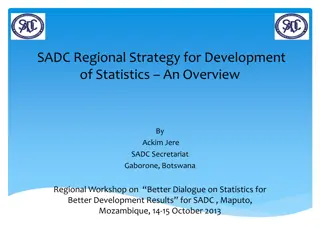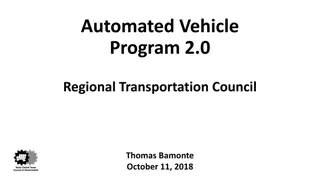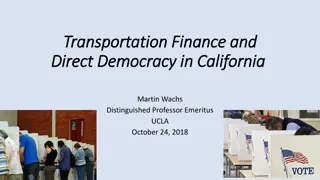Funding Opportunities for Non-Motorized Transportation in South Carolina
The US Department of Transportation's Federal Highway Administration provides funding to South Carolina through the Transportation Alternatives Program (TAP) to support non-motorized transportation initiatives. Local governments, schools, and other entities can partner with the South Carolina Depart
1 views • 21 slides
Transportation & Assignment Problem Overview
The transportation problem involves optimizing shipment costs from multiple sources to multiple destinations with known supply and demand constraints. This chapter discusses the characteristics of transportation problems, key assumptions, and how to formulate the transportation model. Dr. Wasihun T.
0 views • 64 slides
Enhancing Transportation Performance Management through TSMO Collaboration
Advancements in technology and evolving customer needs are driving changes in transportation management. Transportation Systems Management and Operations (TSMO) offers strategies to optimize operational performance, complementing traditional capacity projects. Collaboration between TSMO and Transpor
1 views • 77 slides
Cost Accounting Standards for Determining Transportation Costs
Understanding the importance of transportation costs in procurement and distribution, this guide outlines the standards for determining average costs, separation of transportation costs in accounting records, objectives for maintaining cost uniformity, components of transportation costs, and treatme
0 views • 11 slides
Understanding Transportation Programs and Trends
Transportation training session led by Megan Johnson, featuring topics such as Transportation Crash Course, Training Opportunities, and Transportation Trends & Updates. Includes discussions on different types of transportation services and their importance for communities.
2 views • 38 slides
Richland County Transportation Improvement Summary
Richland County's transportation improvement work includes sessions on project principles, funding options, project costs, and guidelines for utilizing the transportation penny. The focus is on addressing transportation needs, project prioritization, funding challenges, and division of funds for var
0 views • 19 slides
Bus Usage Survey Results by Eastrington Parish Council and Howden Town Council
The bus usage survey conducted by Eastrington Parish Council in conjunction with Howden Town Council reveals insights into transportation habits and satisfaction with the public transport system in the area. The survey data includes information on respondents' locations, age groups, modes of transpo
0 views • 26 slides
Enhancing Regional Integration Through Statistical Collaboration in the GCC
Regional statistics play a crucial role in informing regional policies, monitoring progress, and assessing developmental outcomes. The Gulf Cooperation Council (GCC) has established GCC-Stat as a regional statistics center to meet statistical requirements at the GCC level. By improving regional data
7 views • 8 slides
National Regional Planning Council Survey Insights
The National Regional Planning Council conducted a survey on the use of CAPRADAP, CAPRAD, and related processes among Regional Planning Committees (RPCs). The survey revealed insights on RPC responses, current and future usage of CAPRADAP, application acceptance methods, evaluation timelines, adjace
0 views • 11 slides
Westfield Advisory Council on Disabilities Ordinance Overview
The Westfield Advisory Council on Disabilities Ordinance aims to represent and address the needs and challenges faced by individuals with disabilities in Westfield. The Council will collaborate with the local community, city officials, and stakeholders to establish priorities, strategies, and partne
3 views • 7 slides
Maine DHHS Transportation Programs Overview
The Maine Department of Health and Human Services (DHHS) oversees various transportation programs aimed at providing non-emergency transportation services to low-income, child welfare-eligible, and Section 17-eligible individuals. These programs are managed through regional brokerage systems, with b
3 views • 5 slides
Regional Transportation Council's 2023 Unified Transportation Program Update
The Regional Transportation Council discussed updates to the 2023 Unified Transportation Program, focusing on Category 2 funding discrepancies, proposed project adjustments, development principles for the 10-Year Plan, and regional funding allocations for 2017-2023 UTPs. The plan emphasizes performa
1 views • 14 slides
Importing TIMS Transportation Data into PowerSchool
Explore the process of extracting, formatting, purging, and importing TIMS transportation data into PowerSchool for efficient management of student transportation information. This includes creating TIMS extracts, updating bus stop information, and optimizing transportation planning through geocodin
2 views • 43 slides
Report on Fund Utilization for Regional Activities by the Regional Fund Manager
Clara Atari Ipigansi-Olagbaju, the Regional Fund Manager for WCO-WCA, provides insights into the fund utilization for regional activities at the Experts Committee Meeting in Banjul, Gambia. This report outlines the responsibilities, expectations from regional structures, and the process for making a
0 views • 25 slides
Land Management and Funds Allocation in New Plymouth District Council: Overview
This presentation provides an overview of the New Plymouth District Council Local Purposes (Waitara Lands) Bill, detailing the key provisions related to land sales, fund allocation, and the establishment of a Waitara Community Board and a Waitara Hap Land Fund. The bill outlines the distribution of
0 views • 12 slides
Overview of FAST Act for Transportation Planning
The FAST Act, passed in 2015, authorizes federal programs for transportation development with a focus on surface transportation. It extends funding through 2020, totaling $304.7 billion. The Act aims to enhance resiliency, reliability, and stormwater mitigation in transportation systems. Planning fa
2 views • 10 slides
Tribal Transportation Program & Bipartisan Infrastructure Law Overview
The Tribal Transportation Program (TTP) and Bipartisan Infrastructure Law (BIL) provide funding for essential transportation projects in Tribal communities. The TTP Bridge Fund, Safety Fund, and High Priority Projects aim to improve infrastructure and safety. The BIL funding for FY22-FY26 totals $3.
1 views • 13 slides
State Transportation Innovation Council Comparisons: Pennsylvania, Arizona, New Jersey
A comparison of State Transportation Innovation Council (STIC) initiatives in Pennsylvania, Arizona, and New Jersey. Pennsylvania's STIC Management structure, Arizona's ACTI Membership details, and New Jersey's online STIC Incentive application and Innovative Idea submission process are discussed. E
1 views • 6 slides
Waikato Regional Council Stormwater Guidelines Workshop Overview
The Waikato Regional Council organized an external stakeholder workshop to discuss their new stormwater guidelines, aiming to provide consistent hydrologic design practices in the region. The workshop highlighted the importance of a council-specific guideline, changes from TP 108, allowance for alte
0 views • 20 slides
TD Tampa Bay - Enhancing Transportation Independence and Mobility Initiatives
TD Tampa Bay partnership aims to increase access to essential services, enhance regional connectivity, and provide on-demand transportation services for transportation disadvantaged individuals in the TBARTA region. The initiative includes innovative solutions like cross-county and evening/weekend t
1 views • 9 slides
DHHS Coordination of Transportation Service Contracts Overview
The Department of Health and Human Services in Maine conducted an assessment of Transportation Services in June 2019. The workgroup identified three main priorities: alignment of Quality and Performance Measures, Safety Measures, and Evaluation of Transportation Services. The first priority involves
0 views • 28 slides
Understanding Transportation and Assignment Problem
Transportation and assignment problems involve optimizing the shipment of goods from various sources to multiple destinations while minimizing total transportation costs. These problems deal with limited supply, known demand, constant shipping costs, and integer quantities. The transportation algori
0 views • 64 slides
Enhancing Transportation Infrastructure Through Federal Funding Programs
The Transportation Alternatives Program (TAP) funded by the USDOT's Federal Highway Administration supports transportation projects in South Carolina based on population categories. TAP funds are allocated to Transportation Management Areas (TMAs), Small Urban Areas, and Non-Urban Areas, prioritizin
0 views • 21 slides
Addressing Transportation Gaps in Sudbury: A Livable Community Approach
The Sudbury Transportation Committee, established by the Select Board, aims to enhance transportation in Sudbury to create a livable community. Focusing on inclusivity, equity, and addressing transportation gaps impacting various aspects of livability, the initiative seeks to improve social particip
0 views • 16 slides
Understanding Regional Coordination for Accessible Transportation
This presentation delves into the concept of regional coordination in accessible transportation, focusing on the Regional Transportation Advisory Panel, 5-year regional transportation goals, and the significance of the Safe, Accountable, Flexible, Efficient Transportation Equity Act. It emphasizes t
0 views • 16 slides
Enhancing Livability in Sudbury Through Transportation Initiatives
The GoSudbury! Transportation Update to the Select Board on October 19, 2021 highlights the importance of addressing transportation as a key component of livable communities. The initiative aims to create a safe, secure, and inclusive environment by improving transportation options for residents of
0 views • 26 slides
Regional Special Education Transportation (RSET) Program Overview
RSET, which stands for Regional Special Education Transportation, is an initiative developed by ACES to help districts save money while safely transporting students to out-of-district placement sites. The program benefits districts by reducing transportation costs, addressing parent concerns, and ma
0 views • 13 slides
Understanding Pennsylvania's Medical Assistance Transportation Program (MATP)
The Medical Assistance Transportation Program (MATP) in Pennsylvania provides essential transportation services to access medical care. Governed by state plans and codes, MATP aims to offer access to medical, pharmacy services, chronic disease management, and preventative care. Transportation provid
0 views • 16 slides
Transportation Evolution: Florida Developmental Disabilities Council Initiatives
Sheila Gritz-Swift, Deputy Director of Programs, presents the journey of Florida Developmental Disabilities Council's transportation initiatives from the past to the future. The presentation showcases collaborations, major activities, awards, outcomes, and the impact of programs like the Transportat
0 views • 52 slides
Becoming an Expert Witness in Transportation: Key Steps and Insights
Delve into the world of transportation expertise with the perspectives shared by the Transportation Expert Witness Council. Discover the importance of being a transportation expert, the process of becoming an expert witness, establishing areas of interest, gathering knowledge, technical involvement,
0 views • 29 slides
Climate Change Impacts on U.S. Transportation Infrastructure
The Fourth National Climate Assessment reveals the risks climate change poses to the U.S. transportation system. Heavy precipitation, coastal flooding, heat, and wildfires threaten the reliability, safety, and efficiency of transportation infrastructure, leading to societal and economic consequences
0 views • 11 slides
Regional Transportation Plan Workshop Overview and Elements
This information outlines the purpose and structure of the Regional Transportation Plan Workshop, emphasizing the goals, policies, and strategies for improving transportation within the region. It covers elements such as the planning process, needs assessment, regional and community policy, action i
0 views • 6 slides
Draft Regional Connectivity Scheme (RCS) Overview
The Draft Regional Connectivity Scheme (RCS) introduced by the Ministry of Civil Aviation aims to enhance regional air connectivity by reviving un-served and under-served airports. The scheme focuses on making air travel affordable for the masses, promoting tourism, increasing employment opportuniti
0 views • 23 slides
Africa Regional Integration Index Report 2019 Summary
The Africa Regional Integration Index Report 2019 presented at the Conference of Ministers in Marrakech, Morocco, highlights the framework, dimensions, indicators, and progress on regional integration in Africa. It focuses on aspects such as free movement of people, trade integration, infrastructura
0 views • 10 slides
Understanding the Staff-Council Relationship in Municipal Governance
The staff-council relationship plays a crucial role in the success of local government. Municipal council members and administration have distinct roles, with council governing and leading based on public issues, while administration provides advice and carries out council decisions efficiently. Bot
1 views • 49 slides
Castle Cary Town Council Precept Spending Report 23/24
Castle Cary Town Council allocated precept funds to various community projects and services in the 23/24 fiscal year. The spending included grass cutting, property maintenance, grants to local organizations, staffing costs, and funding joint projects with developers. Additionally, large grants were
0 views • 11 slides
SADC Regional Strategy for Development of Statistics
The SADC Regional Strategy for Development of Statistics aims to address outdated statistical strategies, align with the SADC Regional Indicative Strategic Development Plan, and meet the increasing demand for harmonized regional statistical data. The strategy development process involved collaborati
0 views • 19 slides
Regional Automated Vehicle Program 2.0 Overview
Regional Automated Vehicle Program 2.0, led by the North Texas Regional Transportation Council, aims to facilitate the deployment of automated vehicles (AVs) in public entities. The program consists of various projects such as AV planning, cost coverage, and fund allocations for priority deployments
0 views • 10 slides
Transportation Finance and Direct Democracy in California
Proposition 6 on November 6th has garnered attention, but voters in multiple states will decide on over 250 transportation ballot measures totaling over $55 billion. California, with a longer history and greater funding needs, has been at the forefront of transportation investments, including the us
0 views • 29 slides
Minnesota Council Progress Update and Challenges
The update for Minnesota Council highlights progress made towards goals, challenges faced including COVID impact, and achievements by regional members. Key areas discussed are intake status, regional membership standings, leading districts for intake, and what it takes to be a prosperous council. Th
0 views • 26 slides
